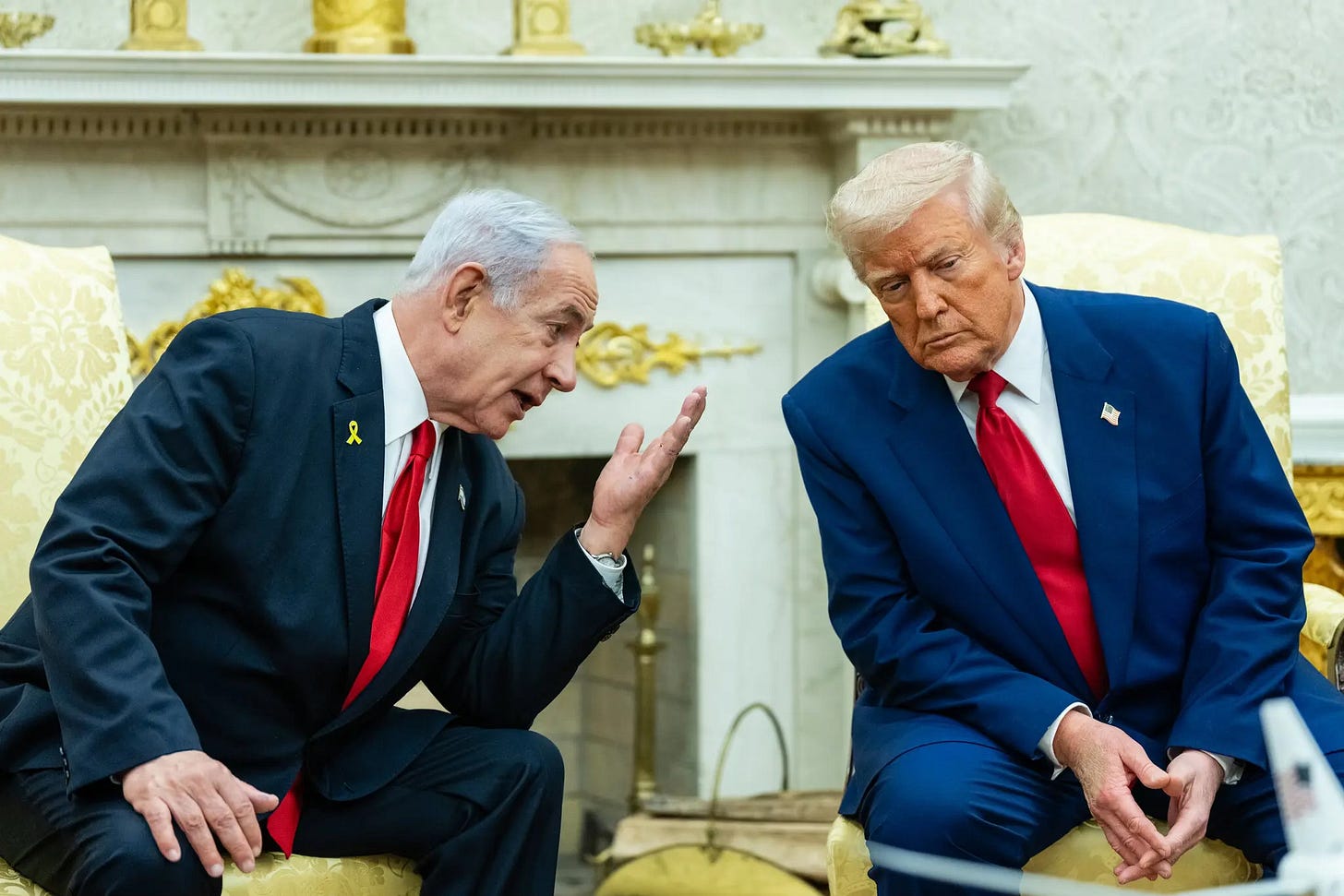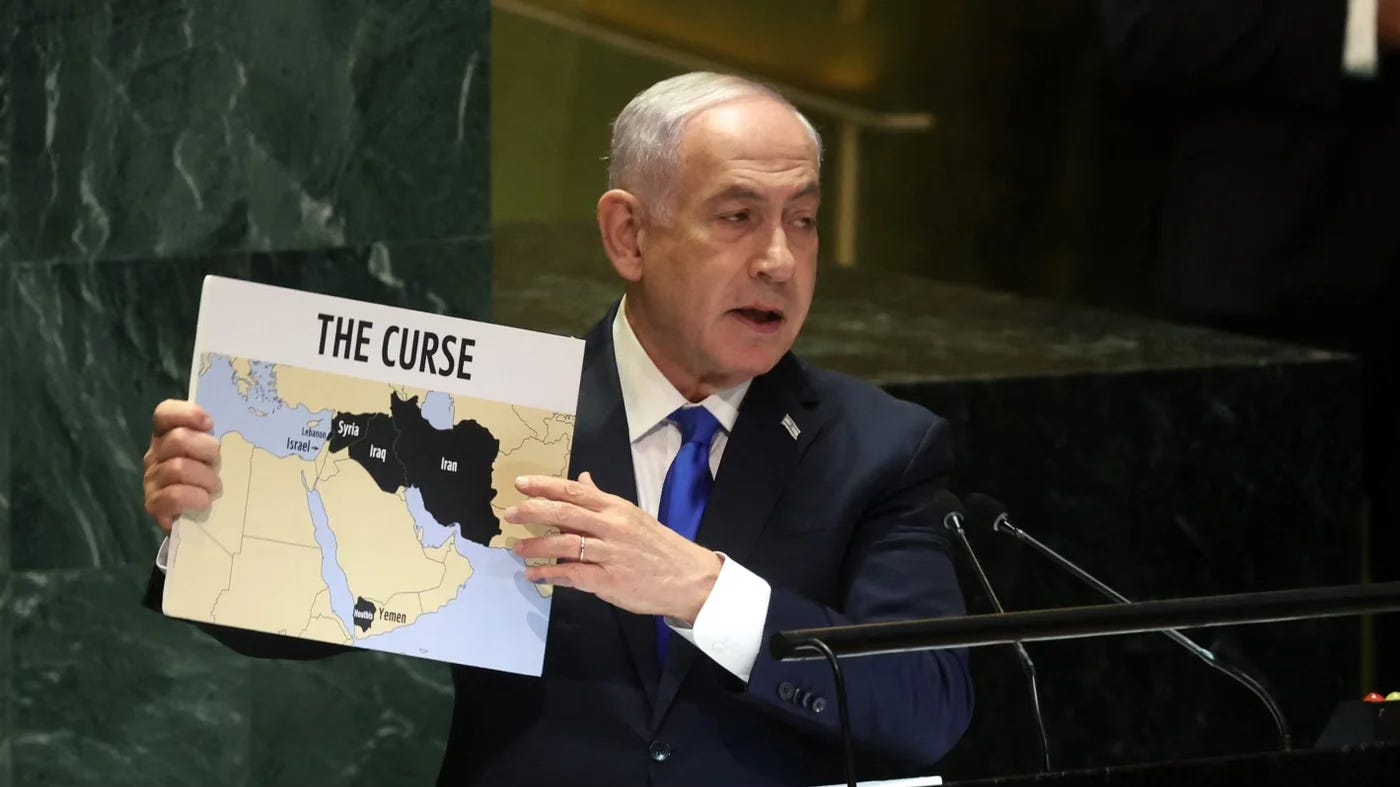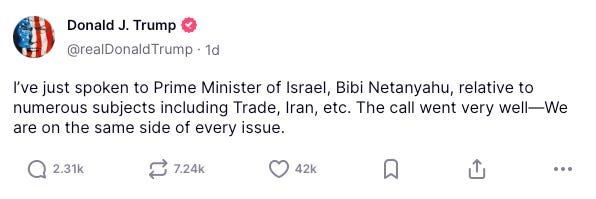Nuclear Talks with Iran Are Promising, but Don't Underestimate the Neocons
The push for peaceful negotiations and denial of an Israeli attack on Iran's nuclear sites shows a turn towards peace. But Neocon hardliners and Israel and its backers aren't out of the fight.

When the Gaza ceasefire was announced before Trump’s January 2025 inauguration, I felt a budding hope that sustained peace in the Middle East wasn’t just a pipe dream. This hope abruptly started fading when Trump proposed displacing Palestinians from Gaza—a soft form of ethnic cleansing—to allow U.S. development of resorts and casinos on its waterfront.
On March 2, when Israel halted all aid to Gaza the day after the ceasefire’s first phase ended—a blockade that’s still ongoing—followed by renewed strikes on the Strip two weeks later, my hope for peace nearly vanished. The final blow came when Trump announced on Truth Social that U.S. military strikes on Yemen’s Houthis had begun in an attempt to protect U.S. and Israeli vessels—a policy that failed under Biden in 2024 and has proven ineffective so far in Trump’s second term. He also shared a video of a strike on alleged Houthi fighters, which the Houthis denied were any of their soldiers.
Trump’s Middle East policy initially echoed his predecessors: unwavering support for Israel and its heinous actions in Gaza, backed by our taxpayer dollars and weapons. Then on April 7, during a press conference with Benjamin Netanyahu, Trump announced that the U.S. would pursue direct talks with Iran for a new nuclear deal, led by Steve Witkoff. Netanyahu voiced support but suggested a “Libyan solution”—a nonstarter for Iran, given Moammar Gadhafi’s fate after dismantling his nuclear program. Despite his stated backing, Netanyahu’s past remarks and the current neoconservative stance on Iran suggest his true intentions are a U.S.-led regime change war in Iran.

According to The New York Times, Trump’s decision to pursue nuclear talks with Iran coincided with his rejection of a planned Israeli attack on Iranian nuclear sites in May, which would have required U.S. military support for both offensive and defensive operations. This shift toward diplomacy followed lobbying by Vice President JD Vance, Director of National Intelligence Tulsi Gabbard, Defense Secretary Pete Hegseth, and White House Chief of Staff Susie Wiles, despite calls for strikes from Secretary of State Marco Rubio and National Security Adviser Mike Waltz.
The proposed attack, which the Israelis estimated would delay Iran’s nuclear program by only a year, would risk sparking a broader war in the Middle East. U.S. intelligence assesses that Iran has no current intention of building a nuclear weapon, making the strike’s potential costs—countless lives, economic strain, and a possible oil crisis if Iran closed the Strait of Hormuz—disproportionate. Even a limited Iranian retaliation could target not only Israel but also U.S. military bases, businesses, and diplomatic sites across the region.
With Steve Witkoff leading negotiations, the talks have progressed well, with two rounds completed and technical details now under discussion. The deal is starting to resemble Obama’s 2015 JCPOA, which Trump abandoned in 2018 under pressure from neoconservatives and Israeli Prime Minister Benjamin Netanyahu. A third round is planned for April 26 in Rome.
Despite this progress, Israel and Washington’s neoconservatives continue to push for strikes and regime change in Iran. On April 18, Israeli Strategic Affairs Minister Ron Dermer and Mossad Director David Barnea met Witkoff unannounced in Paris to advocate for Iran’s full denuclearization, but they failed to sway him towards pushing for a deal Iran wouldn’t accept.
Drop Site News reports that Merav Ceren, was appointed to the National Security Council (NSC) to direct foreign policy towards Israel and Iran. She previously worked for Israel’s Ministry of Defense and was a fellow at the pro-Israel Foundation forDefense of Democracies (FDD). Her role raises concerns about Israel’s influence on Trump’s foreign policy, potentially pushing toward conflict with Iran. Typically, even U.S.-born citizens with foreign ties—such as one having parents from Pakistan—face scrutiny and wouldn’t be allowed to help shape foreign policy for in this case Pakistan, making Ceren’s appointment unusual. Meanwhile, Trump appointed Mark Levin, a neoconservative advocate of military strikes on Iran regardless of negotiation outcomes, to the Homeland Security Advisory Council, signaling persistent hawkish pressure.
Outside of these appointments the recent firings of top DoD officials due to alleged leaking, which they all deny, leave a power vacuum at the DoD. The termination of former senior adviser Dan Caldwell, former deputy chief of staff Darin Selnick and Colin Carroll, the deputy Defense secretary’s former chief of staff while Pete Hegseth, the US secretary of defense is embroiled in another Signal scandal presents a unique opportunity to neocons. Mr. Hegseth’s former senior adviser, Mr. Caldwell, a competent and capable non-interventionist and global war on terror veteran said on a recent interview with Tucker Carlson that he believes he was fired due to his views on a potential Iranian conflict. Drop Site News uncovered that the firings were in part tied to Mr. Carroll reporting to the DoD that a journalist contacted him for a comment on an Inspector General investigation that involved someone else. With Defense Secretary Pete Hegseth distracted by a Signal messaging scandal, the DoD’s disarray risks empowering more experienced, hawkish neoconservative officials, threatening the fragile progress toward peace in the Middle East.
Trump’s foreign policy, particularly thus far in the Middle East, defies simple labels like dovish or hawkish, is best described as distinctly Trumpian. While he has resisted Israeli pressure and avoided war with Iran—most notably by rejecting a planned strike on its nuclear sites—he faces formidable opposition. Many in Washington’s establishment, who misled the U.S. into the Iraq War and other regime-change conflicts in the region, retain influence across government, mainstream media, and think tanks. The Israel lobby wields significant power in Congress, and Benjamin Netanyahu may seek a broader conflict to address his own domestic challenges. Despite diplomatic progress, the push for strikes on Iran remains strong and I certainly wouldn’t bet against the neocons. A Truth Social post by Trump on April 22, 2025, underscores the uncertainty, though its implications are unclear.




This article was quite informative on all points on what is happening with Iran, Israel and the United States. Thank you.